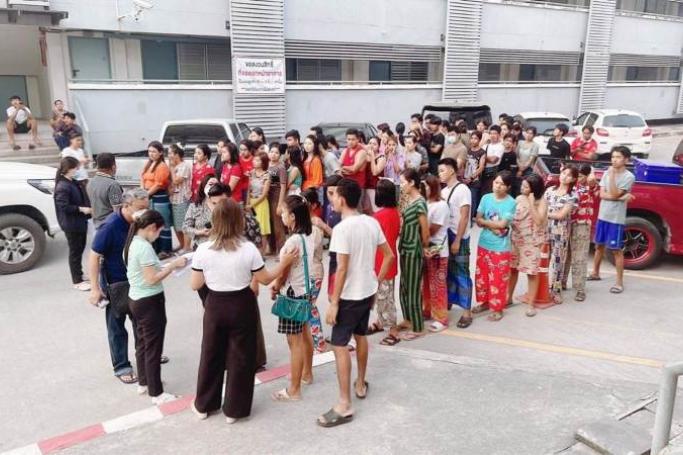Campaign group the Human Rights Foundation of Monland (HURFOM) says that the junta’s new policy regarding workers employed outside of the country is very problematic
On 1 September 2023, the military declared that migrant workers abroad must transfer 25% of their salary to domestic banks in Myanmar via the official transfer systems. If not, they would be banned from working abroad for three years.
After the attempted coup, many countries in the international community undertook economic sanctions to show their opposition to the junta. The World Bank also decided to halt loans to Myanmar. As a result, HURFOM points out, export income has declined, and the economic sanctions of the international community are proving to have some impact.
Singapore recently decided to cut its dealings with two banks controlled by the military. These efforts make it more difficult for the junta to access US dollars. In response, the regime has turned to exploiting migrant workers abroad as a short-term remedy to access US dollars, according to HURFOM.
“We’ve worked hard for this money and must send 25% to the junta. It’s unfair. When we were in trouble abroad, no one came to help us,” said a Burmese migrant worker in Thailand.
When transferring their salary to their families, most migrant workers use a fast, simple, and illegal money transfer agency rather than the complicated and often delayed official banking system.
After declaring the new law targeting migrant workers, the junta began to arrest illegal money transfer agencies and their brokers in Mon State, according to HURFOM. From 15 to 17 September 2023, five dishonest money transfer brokers were arrested in Kyike Hto, Paung, and Thaton Townships and face charges under section 171 of the Monetary Association Laws Act.
“They’ve arrested illegal money transfer brokers to increase the pressure on migrant workers to use the official banking system. If so, the regime will get 25% of their salary,” said a local source.
Critics of the new law note the junta already exploits income from natural resource extraction to kill its people. Migrant workers are unwilling to send their salaries back to banks controlled by the junta as they don’t want their salary to be a contribution to killing people in Myanmar, says HURFOM. In addition, the military-controlled banks use an exchange rate much lower than the exchange rate used in the market.
On 19 September 2023, one Thai Baht was equivalent to 96.5 MMK in the actual market, but the junta-controlled banks say the Thai Baht equals 55 MMK. One US dollar is equivalent to more than 3,000 MMK in the market, but one US dollar is priced at more than 2,000 MMK in domestic banks.
After the attempted coup, the number of workers interested in working abroad sharply increased, according to HURFOM. Many go abroad via legal Memorandum of Understanding (MOU) pathways with select countries or through undocumented routes.
“Migrant workers who came under MOU agreements often have to do jobs different from the job classifications described in their contracts. Even though they came with an MOU, they couldn’t get a job when they arrived. They had to wait for months. It’s terrible,” said a migrant worker in Thailand.
The junta is now pressuring foreign work agencies to ensure that migrant workers have signed documents agreeing to send 25% of their salary back to their native country before they leave: “I had to sign the document. But I don’t know how to transfer back my salary,” said a migrant worker who recently left Burma.
“One of my friends had gone to South Korea for work, and they had to sign a document agreeing to return 25% of their salary before departure. It’s compulsory,” said another local source.
The National Unity Government says this latest move by the junta is a breach of the 1999 Foreign Work Law and is abusive and oppresses migrant workers.
On 16 October 2023, the military junta announced that Burmese people living and working overseas must show a recommendation letter from the Internal Revenue Department of the Ministry of Planning and Finance to prove they have paid their income tax before extending their passport validity.
The statement is intended for two types of passports – passports for jobs (PJ) and passports for the seaman (PS). The military junta has tried to collect income tax from overseas workers and pressured them to transfer 25% of their income to domestic banks.
“The junta has used various ways to extort money from overseas workers. Now, they’ve threatened us with our passports, and it’s inevitable for overseas workers in Singapore. We can’t overstay here,” said a Burmese overseas worker in Singapore.
If an overseas worker fails to prove he/ she has already paid their income tax, the junta threatens that they will not extend their passport validity.
“If we have to pay income tax and transfer 25% of our wages, we have nothing left. We had to spend millions of Myanmar Kyats (MMK) to work in Singapore. Now, many people have come to work in Singapore, so it isn’t okay like before. It’s difficult to get a job, and we don’t have “overtime,” said one overseas worker.
The military junta has instructed Burmese overseas workers to pay their income tax after 1 October 2023. “We have to overcome many challenges to work abroad. The junta doesn’t show any mercy and tries to get our hard-earned money. It’s unfair,” said an overseas worker.












